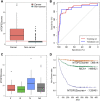Effective Identification of Maternal Malignancies in Pregnancies Undergoing Noninvasive Prenatal Testing
- PMID: 35265103
- PMCID: PMC8900746
- DOI: 10.3389/fgene.2022.802865
Effective Identification of Maternal Malignancies in Pregnancies Undergoing Noninvasive Prenatal Testing
Abstract
Background: The existence of maternal malignancy may cause false-positive results or failed tests of NIPT. Though recent studies have shown multiple chromosomal aneuploidies (MCA) are associated with malignancy, there is still no effective solution to identify maternal cancer patients from pregnant women with MCA results using NIPT. We aimed to develop a new method to effectively detect maternal cancer in pregnant women with MCA results using NIPT and a random forest classifier to identify the tissue origin of common maternal cancer types. Methods: For examination, 496 participants with MCA results via NIPT were enrolled from January 2016 to June 2019 at BGI. Cancer and non-cancer participants were confirmed through the clinical follow-up. The cohort comprising 42 maternal cancer cases and 294 non-cancer cases enrolled from January 2016 to December 2017 was utilized to develop a method named mean of the top five chromosome z scores (MTOP5Zscores). The remaining 160 participants enrolled from January 2018 to June 2019 were used to validate the performance of MTOP5Zscores. We established a random forest model to classify three common cancer types using normalized Pearson correlation coefficient (NPCC) values, z scores of 22 chromosomes, and seven plasma tumor markers (PTMs) as predictor variables. Results: 62 maternal cancer cases were confirmed with breast cancer, liver cancer, and lymphoma, the most common cancer types. MTOP5Zscores showed a sensitivity of 85% (95% confidence interval (CI), 62.11-96.79%) and specificity of 80% (95% CI, 72.41-88.28%) in the detection of maternal cancer among pregnant women with MCA results. The sensitivity of the classifier was 93.33, 66.67, and 50%, while specificity was 66.67, 90, and 97.06%, and positive predictive value (PPV) was 60.87, 72.73, and 80% for the prediction of breast cancer, liver cancer, and lymphoma, respectively. Conclusion: This study presents a solution to identify maternal cancer patients from pregnant women with MCA results using NIPT, indicating it as a value-added application of NIPT in the detection of maternal malignancies in addition to screening for fetal aneuploidies with no extra cost.
Keywords: cell-free DNA; classifier; maternal malignancy; non-invasive prediction; random forest.
Copyright © 2022 Li, Ju, Zhao, Liu, Yuan, Liu, Zhou, Han, Yuan, Huang, Xie, Li, Chen, Huang, Chen, Li, Tan, Wang, Zhou, Zhang, Zeng, Yu, Su, Chen, Ge, Huang and Jin.
Conflict of interest statement
JL was employed by Shijiazhuang BGI Genomics Co., Ltd. The remaining authors declare that the research was conducted in the absence of any commercial or financial relationships that could be construed as a potential conflict of interest.
Figures




References
LinkOut - more resources
Full Text Sources
Miscellaneous

